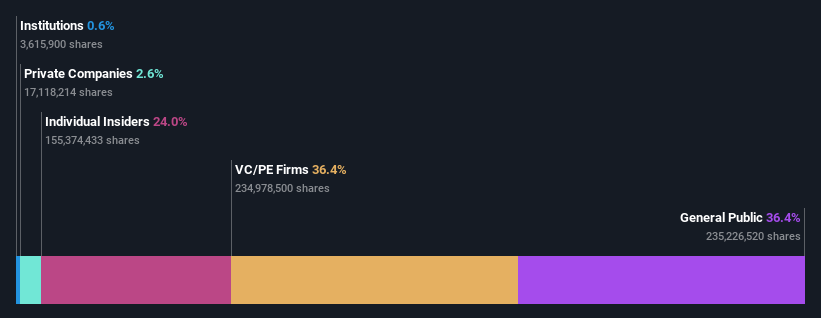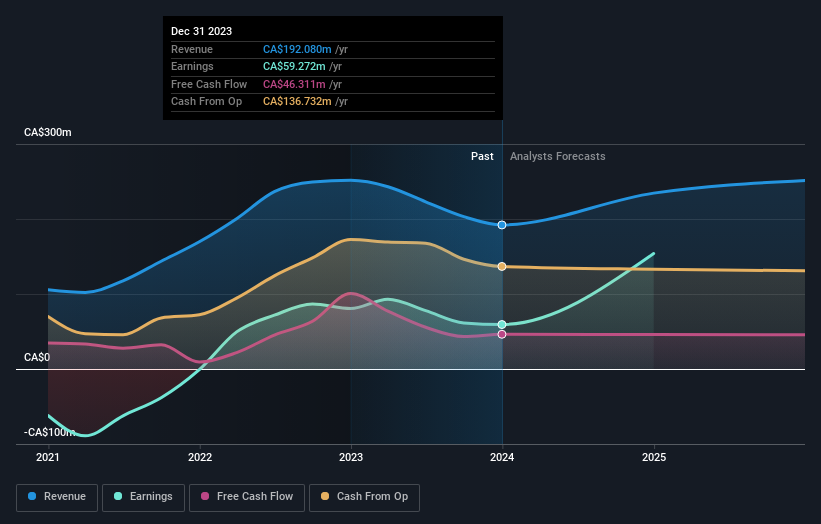Lucero Energy Corp.'s (CVE:LOU) top owners are retail investors with 36% stake, while 36% is held by private equity firms
Key Insights
Lucero Energy's significant retail investors ownership suggests that the key decisions are influenced by shareholders from the larger public
55% of the business is held by the top 2 shareholders
A look at the shareholders of Lucero Energy Corp. (CVE:LOU) can tell us which group is most powerful. We can see that retail investors own the lion's share in the company with 36% ownership. Put another way, the group faces the maximum upside potential (or downside risk).
Meanwhile, private equity firms make up 36% of the company’s shareholders.
In the chart below, we zoom in on the different ownership groups of Lucero Energy.
See our latest analysis for Lucero Energy
What Does The Lack Of Institutional Ownership Tell Us About Lucero Energy?
We don't tend to see institutional investors holding stock of companies that are very risky, thinly traded, or very small. Though we do sometimes see large companies without institutions on the register, it's not particularly common.
There could be various reasons why no institutions own shares in a company. Typically, small, newly listed companies don't attract much attention from fund managers, because it would not be possible for large fund managers to build a meaningful position in the company. On the other hand, it's always possible that professional investors are avoiding a company because they don't think it's the best place for their money. Lucero Energy might not have the sort of past performance institutions are looking for, or perhaps they simply have not studied the business closely.
We note that hedge funds don't have a meaningful investment in Lucero Energy. Our data shows that First Reserve Management, L.P. is the largest shareholder with 36% of shares outstanding. M. Chernoff is the second largest shareholder owning 19% of common stock, and Kai Investment Trust holds about 2.6% of the company stock. In addition, we found that Brett Herman, the CEO has 2.0% of the shares allocated to their name.
A more detailed study of the shareholder registry showed us that 2 of the top shareholders have a considerable amount of ownership in the company, via their 55% stake.
While it makes sense to study institutional ownership data for a company, it also makes sense to study analyst sentiments to know which way the wind is blowing. There is some analyst coverage of the stock, but it could still become more well known, with time.
Insider Ownership Of Lucero Energy
The definition of company insiders can be subjective and does vary between jurisdictions. Our data reflects individual insiders, capturing board members at the very least. Management ultimately answers to the board. However, it is not uncommon for managers to be executive board members, especially if they are a founder or the CEO.
Most consider insider ownership a positive because it can indicate the board is well aligned with other shareholders. However, on some occasions too much power is concentrated within this group.
It seems insiders own a significant proportion of Lucero Energy Corp.. Insiders own CA$98m worth of shares in the CA$407m company. It is great to see insiders so invested in the business. It might be worth checking if those insiders have been buying recently.
General Public Ownership
The general public-- including retail investors -- own 36% stake in the company, and hence can't easily be ignored. While this group can't necessarily call the shots, it can certainly have a real influence on how the company is run.
Private Equity Ownership
With a stake of 36%, private equity firms could influence the Lucero Energy board. Some investors might be encouraged by this, since private equity are sometimes able to encourage strategies that help the market see the value in the company. Alternatively, those holders might be exiting the investment after taking it public.
Next Steps:
While it is well worth considering the different groups that own a company, there are other factors that are even more important.
I like to dive deeper into how a company has performed in the past. You can access this interactive graph of past earnings, revenue and cash flow, for free.
If you would prefer discover what analysts are predicting in terms of future growth, do not miss this free report on analyst forecasts.
NB: Figures in this article are calculated using data from the last twelve months, which refer to the 12-month period ending on the last date of the month the financial statement is dated. This may not be consistent with full year annual report figures.
Have feedback on this article? Concerned about the content? Get in touch with us directly. Alternatively, email editorial-team (at) simplywallst.com.
This article by Simply Wall St is general in nature. We provide commentary based on historical data and analyst forecasts only using an unbiased methodology and our articles are not intended to be financial advice. It does not constitute a recommendation to buy or sell any stock, and does not take account of your objectives, or your financial situation. We aim to bring you long-term focused analysis driven by fundamental data. Note that our analysis may not factor in the latest price-sensitive company announcements or qualitative material. Simply Wall St has no position in any stocks mentioned.

 Yahoo Finance
Yahoo Finance 

